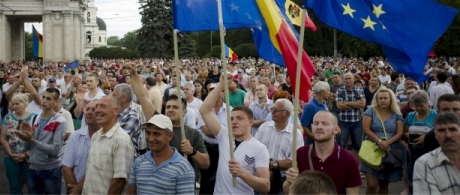Georgia, Moldova and Ukraine signed EU association agreements in 2014, but reforms are now stalling. The EU needs to push the three governments to do more.

Europe’s southern neighbourhood is in such a state of chaos, with civil war in Syria and anarchy in Libya driving migrants and refugees onto European shores, that few EU leaders are paying attention to the Eastern neighbourhood. But Europe cannot ignore the challenges and opportunities there. There are limits to what it can do with Armenia, Belarus and Azerbaijan: it should encourage improved relations with the first two; and do its best to respond to repression and corruption in the third. But its priority should be to re-energise reform processes in Georgia, Moldova and Ukraine, in alliance with populations desperate for better governance and an end to crony capitalism.
In Armenia, progress in relations with the EU stalled in 2013 when Moscow leant on Yerevan to join the Russian-led Eurasian Economic Union rather than signing an association agreement with the EU. Since then, however, the EU and Armenia have started negotiating a new deal, designed to preserve as much of the draft association agreement as possible. Armenia depends on Russia for its security, but the EU should help it to keep what freedom of manoeuvre it can in foreign policy and trade relations.
In Belarus, President Aleksandr Lukashenko will go through the formality of being re-elected in rigged elections on October 11th. In the past, the EU would probably have responded with another round of sanctions, but Lukashenko has been on his best behaviour, releasing all Belarus’s political prisoners; and he has played the international statesman, hosting talks on the war in Ukraine. He wants to show Russian president Vladimir Putin that Belarus has European as well as Eurasian options. The EU should respond positively, though without illusions: Lukashenko has a long history of hedging his bets between Moscow and Brussels.
Belarus is no longer ‘Europe’s last dictatorship’. Azerbaijan under President Ilham Aliyev is the unquestioned champion now, locking up journalists and human rights activists and accusing the West of using a ‘fifth column’ to destabilise the country. Azerbaijan poses a dilemma: on the one hand, it is a crucial element in Europe’s strategy of energy diversification; on the other, it is an increasingly paranoid and corrupt dictatorship. The EU is a major purchaser of Azerbaijan’s oil and gas, which ought to give it some leverage. Russia, however, has its own levers: it can offer Azerbaijan more support in its conflict with Armenia (which has occupied almost 14 per cent of Azerbaijan’s territory since their 1988-94 war); and it will not raise inconvenient human rights issues. Europe is likely to continue an awkwardly balanced policy of buying Baku’s oil and gas while doing the bare minimum to support Azerbaijan’s battered civil society.
The credibility of the EU's policy in Eastern Europe, however, depends ultimately on the progress of reforms in Georgia, Moldova and Ukraine, the countries that claim to want to integrate more closely with the EU.
Charles Grant has recently set out the obstacles to Ukraine’s transformation. Progress in Ukraine was bound to be slower than people hoped, even without Russia’s meddling. The authorities could have used the war to justify more radical reforms, while blaming Russia for the associated pain. Instead, the unpopular coalition government is now fraying as different factions try to blame each other for setbacks. Reformist MPs (including from President Petro Poroshenko’s party) are frustrated, and worry that the oligarchs are digging in to defend Ukraine’s corrupt old system. The recruitment of new police forces is cutting the level of petty graft; but the new anti-corruption bureau is moving at a snail’s pace in the fight against high-level corruption.
Georgia’s parliamentary elections are not due until October 2016, but the political situation is already tense. Prime Minister Irakli Garibashvili told a recent international conference that the association agreement with the EU was a “masterplan for Georgia’s modernisation”, but President Giorgi Margvelashvili warned the same audience that a growing number of people opposed Georgia’s pro-Western course. The failure of the EU and NATO to offer Georgia a firm commitment to membership supports Russia's argument that Georgia would do better to accept its place in Moscow’s orbit than pursue the mirage of Western integration.
Behind the scenes, oligarch and former prime minister Bidzina Ivanishvili seems to influence every political decision in Georgia. His rhetoric is pro-Western, but many local commentators fear that his major financial interests in Russia affect his real views. The ‘Georgian Dream’ coalition which he led to power in 2012 is losing support, and there are hints that he is putting together a more pro-Moscow coalition for the next elections, built around conservative and religious groups; that way, even if ‘Georgian Dream’ lost power, Ivanishvili could retain influence. The EU and the US worry about the erosion of media freedom in Georgia, and prosecution of Ivanishvili’s political enemies, particularly former president Mikheil Saakashvili (now the governor of Odessa in Ukraine).
Meanwhile Moldova is in chaos. The country has had four prime ministers so far this year. Thousands of protesters have been on the streets of the capital, Chișinău, following a banking fraud which led to the collapse of three banks and a government bail-out which has cost Moldova $1 billion, about 16 per cent of its GDP. The pro-EU coalition barely held onto power in parliamentary elections in November 2014, when it had the association agreement and visa liberalisation agreement with the EU to its credit; if, as seems likely, early elections take place, there is a high probability that the (more pro-Russian) Communist Party will take over.
The issues of #Georgia, #Moldova & #Ukraine all link to the persistence of corrupt oligarchic systemsTweet this
The #EU's eastern flank needs well-governed stable countries - not #Russian influenced basket-casesTweet this
Written by Ian Bond
Ian Bond is director of foreign policy at the Centre for European Reform.
Comments
- See more at: http://www.cer.org.uk/publications/archive/bulletin-article/2015/eastern-mess-eus-partners-need-attention?utm_source=All+website+signups+as+of+21+March+2014&utm_campaign=38f3ad81ec-bulletin104_st_eurozone_reap_it_has_sown&utm_medium=email&utm_term=0_c3be79867d-38f3ad81ec-301763949#sthash.9fP1x3ww.dpuf

Δεν υπάρχουν σχόλια:
Δημοσίευση σχολίου